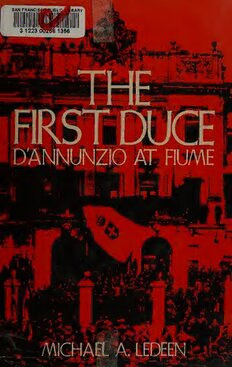
The First Duce: DAnnunzio at Fiume PDF
Preview The First Duce: DAnnunzio at Fiume
SAN FRANCIS] RARY ,V i ' >3" 'V Gabriele D’Annunzio was one of the most flamboyant figures in the political history of modern Europe. A poet in the Byronic style and a popular hero of the First World War, D’Annunzio passionately believed that the sacrifices of war should prelude a new social order. His capture in 1919 of the city of Fiume, claimed by Italy as part of the settlement after the Paris Peace Confer¬ ence, has been popularized and romanti¬ cized ever since. Little has been done, however, to study D’Annunzio the man and his ideas. From new information gathered from Italian and Amercian archives and from personal interviews, Michael A. Le- deen examines the sixteen months of D’Annunzio’s personal rule in Fiume, see¬ ing it as the harbinger of the successful mass movements of the rest of this century. The connection between D’Annunzio and Fascism is central to Ledeen’s narrative, for the poet has often been described as the John the Baptist of Italian Fascism. Virtually the entire ritual of Fascist politics made familiar by Mussolini—the balcony address, the Roman salute, the dramatic dialogues with the crowd, the use of reli¬ gious symbols in a new secular setting— was taken over from the “Free State of Fiume.” D'Annunzio and Mussolini were both masters of the political style based on personal charisma that was so successful following the trauma of the Great War. Each spoke for a “new” Italy and, eventually, for a new world. Each attempted to transform his countrymen into more heroic types by an ethic of violence and grandeur. Yet there were, as Ledeen brings sharply into focus, profound differences between D’Annunzio’s vision of a new1 world and that offered by Fascism, and Fiume under the poet was a far cry from Italy under Mussolini. Significantly, D’Annunzio was able to enlist the support of the most di¬ verse elements of society—politicians and businessmen in addition to representatives of radical trade unions, anarchist groups, and the armed forces. Thus Fiume, Ledeen SAN ANCISCO PUBLI LIBfiAH 3 1223 00256 1356 THE FIRST DUCE Gabriele D’Annunzio THE FIRST DUCE D’Annunzio at Flume Michael A. Ledeen The Johns Hopkins University Press • Baltimore • London This book is dedicated to my teachers Alvin Frank Richard Heffner George Mosse Richard Popkin Julius Weinberg Other Books by the Author Universal Fascism: The Theory and Practice of the Fascist International, 1928-1936 Fascism: An Informal Introduction to Its Theory and Practice (with Renzo de Felice) Copyright © 1977 by The Johns Hopkins University Press All rights reserved. No part of this book may be reproduced or transmitted in any form or by any means, electronic or mechanical, including photocopying, recording, xerography, or any information storage and retrieval system, without permission in writing from the publisher. Manufactured in the United States of America The Johns Hopkins University Press, Baltimore, Maryland 21218 The Johns Hopkins Press, Ltd., London Originally published as D’Annunzio a Fiume (Bari: Giuseppe Laterza & Figli, 1975). English- language edition prepared by the author. Library of Congress Catalog Card Number 76-47376 ISBN 0-8018-1860-5 Library of Congress Cataloging in Publication data will be found on the last printed page of this book. 0(5 2f<r- S. F, PUBLIC LIBRATTf Contents 1 The Star 1 2 The Stage 17 3 Setting the Stage 36 4 The Sacred Entrance 58 5 Searching for Definition 78 6 Behind the Stage Door 100 7 The Definition of the Adventure 115 8 The D’Annunzian World 139 9 The March toward the Future 161 10 The End of the Fiuman Adventure 187 Note on Archival Sources 205 Notes 207 Index 223
